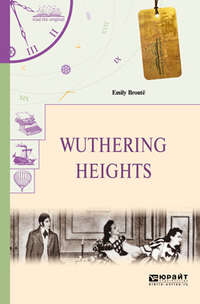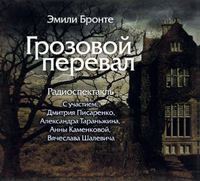
Полная версия
Лучшие романы сестер Бронте / The best of the Brontë sisters
“Very likely,” I returned; “or perhaps clerk or agent to a wine-merchant.”
Bessie and I conversed about old times an hour longer, and then she was obliged to leave me: I saw her again for a few minutes the next morning at Lowton, while I was waiting for the coach. We parted finally at the door of the Brocklehurst Arms there: each went her separate way; she set off for the brow of Lowood Fell to meet the conveyance which was to take her back to Gateshead, I mounted the vehicle which was to bear me to new duties and a new life in the unknown environs of Millcote.
Chapter XI
A new chapter in a novel is something like a new scene in a play; and when I draw up the curtain this time, reader, you must fancy you see a room in the George Inn at Millcote, with such large figured papering on the walls as inn rooms have; such a carpet, such furniture, such ornaments on the mantelpiece, such prints, including a portrait of George the Third, and another of the Prince of Wales, and a representation of the death of Wolfe[18]. All this is visible to you by the light of an oil lamp hanging from the ceiling, and by that of an excellent fire, near which I sit in my cloak and bonnet; my muff and umbrella lie on the table, and I am warming away the numbness and chill contracted by sixteen hours’ exposure to the rawness of an October day: I left Lowton at four o’clock a.m., and the Millcote town clock is now just striking eight.
Reader, though I look comfortably accommodated, I am not very tranquil in my mind. I thought when the coach stopped here there would be some one to meet me; I looked anxiously round as I descended the wooden steps the “boots” placed for my convenience, expecting to hear my name pronounced, and to see some description of carriage waiting to convey me to Thornfield. Nothing of the sort was visible; and when I asked a waiter if any one had been to inquire after a Miss Eyre, I was answered in the negative: so I had no resource but to request to be shown into a private room: and here I am waiting, while all sorts of doubts and fears are troubling my thoughts.
It is a very strange sensation to inexperienced youth to feel itself quite alone in the world, cut adrift from every connection, uncertain whether the port to which it is bound can be reached, and prevented by many impediments from returning to that it has quitted. The charm of adventure sweetens that sensation, the glow of pride warms it; but then the throb of fear disturbs it; and fear with me became predominant when half-an-hour elapsed and still I was alone. I bethought myself to ring the bell.
“Is there a place in this neighbourhood called Thornfield?” I asked of the waiter who answered the summons.
“Thornfield? I don’t know, ma’am; I’ll inquire at the bar.” He vanished, but reappeared instantly –
“Is your name Eyre, Miss?”
“Yes.”
“Person here waiting for you.”
I jumped up, took my muff and umbrella, and hastened into the inn-passage: a man was standing by the open door, and in the lamp-lit street I dimly saw a one-horse conveyance.
“This will be your luggage, I suppose?” said the man rather abruptly when he saw me, pointing to my trunk in the passage.
“Yes.” He hoisted it on to the vehicle, which was a sort of car, and then I got in; before he shut me up, I asked him how far it was to Thornfield.
“A matter of six miles.”
“How long shall we be before we get there?”
“Happen an hour and a half.”
He fastened the car door, climbed to his own seat outside, and we set off. Our progress was leisurely, and gave me ample time to reflect; I was content to be at length so near the end of my journey; and as I leaned back in the comfortable though not elegant conveyance, I meditated much at my ease.
“I suppose,” thought I, “judging from the plainness of the servant and carriage, Mrs. Fairfax is not a very dashing person: so much the better; I never lived amongst fine people but once, and I was very miserable with them. I wonder if she lives alone except this little girl; if so, and if she is in any degree amiable, I shall surely be able to get on with her; I will do my best; it is a pity that doing one’s best does not always answer. At Lowood, indeed, I took that resolution, kept it, and succeeded in pleasing; but with Mrs. Reed, I remember my best was always spurned with scorn. I pray God Mrs. Fairfax may not turn out a second Mrs. Reed; but if she does, I am not bound to stay with her! let the worst come to the worst, I can advertise again. How far are we on our road now, I wonder?”
I let down the window and looked out; Millcote was behind us; judging by the number of its lights, it seemed a place of considerable magnitude, much larger than Lowton. We were now, as far as I could see, on a sort of common[19]; but there were houses scattered all over the district; I felt we were in a different region to Lowood, more populous, less picturesque; more stirring, less romantic.
The roads were heavy, the night misty; my conductor let his horse walk all the way, and the hour and a half extended, I verily believe, to two hours; at last he turned in his seat and said –
“You’re noan so far fro’ Thornfield now.”
Again I looked out: we were passing a church; I saw its low broad tower against the sky, and its bell was tolling a quarter; I saw a narrow galaxy of lights too, on a hillside, marking a village or hamlet. About ten minutes after, the driver got down and opened a pair of gates: we passed through, and they clashed to behind us. We now slowly ascended a drive, and came upon the long front of a house: candlelight gleamed from one curtained bow-window; all the rest were dark. The car stopped at the front door; it was opened by a maid-servant; I alighted and went in.
“Will you walk this way, ma’am?” said the girl; and I followed her across a square hall with high doors all round: she ushered me into a room whose double illumination of fire and candle at first dazzled me, contrasting as it did with the darkness to which my eyes had been for two hours inured; when I could see, however, a cosy and agreeable picture presented itself to my view.
A snug small room; a round table by a cheerful fire; an arm-chair high-backed and old-fashioned, wherein sat the neatest imaginable little elderly lady, in widow’s cap, black silk gown, and snowy muslin apron; exactly like what I had fancied Mrs. Fairfax, only less stately and milder looking. She was occupied in knitting; a large cat sat demurely at her feet; nothing in short was wanting to complete the beau-ideal of domestic comfort. A more reassuring introduction for a new governess could scarcely be conceived; there was no grandeur to overwhelm, no stateliness to embarrass; and then, as I entered, the old lady got up and promptly and kindly came forward to meet me.
“How do you do, my dear? I am afraid you have had a tedious ride; John drives so slowly; you must be cold, come to the fire.”
“Mrs. Fairfax, I suppose?” said I.
“Yes, you are right: do sit down.”
She conducted me to her own chair, and then began to remove my shawl and untie my bonnet-strings; I begged she would not give herself so much trouble.
“Oh, it is no trouble; I dare say your own hands are almost numbed with cold. Leah, make a little hot negus[20] and cut a sandwich or two: here are the keys of the storeroom.”
And she produced from her pocket a most housewifely bunch of keys, and delivered them to the servant.
“Now, then, draw nearer to the fire,” she continued. “You’ve brought your luggage with you, haven’t you, my dear?”
“Yes, ma’am.”
“I’ll see it carried into your room,” she said, and bustled out.
“She treats me like a visitor,” thought I. “I little expected such a reception; I anticipated only coldness and stiffness: this is not like what I have heard of the treatment of governesses; but I must not exult too soon.”
She returned; with her own hands cleared her knitting apparatus and a book or two from the table, to make room for the tray which Leah now brought, and then herself handed me the refreshments. I felt rather confused at being the object of more attention than I had ever before received, and, that too, shown by my employer and superior; but as she did not herself seem to consider she was doing anything out of her place, I thought it better to take her civilities quietly.
“Shall I have the pleasure of seeing Miss Fairfax to-night?” I asked, when I had partaken of what she offered me.
“What did you say, my dear? I am a little deaf,” returned the good lady, approaching her ear to my mouth.
I repeated the question more distinctly.
“Miss Fairfax? Oh, you mean Miss Varens! Varens is the name of your future pupil.”
“Indeed! Then she is not your daughter?”
“No, – I have no family.”
I should have followed up my first inquiry, by asking in what way Miss Varens was connected with her; but I recollected it was not polite to ask too many questions: besides, I was sure to hear in time.
“I am so glad,” she continued, as she sat down opposite to me, and took the cat on her knee; “I am so glad you are come; it will be quite pleasant living here now with a companion. To be sure it is pleasant at any time; for Thornfield is a fine old hall, rather neglected of late years perhaps, but still it is a respectable place; yet you know in winter-time one feels dreary quite alone in the best quarters. I say alone – Leah is a nice girl to be sure, and John and his wife are very decent people; but then you see they are only servants, and one can’t converse with them on terms of equality: one must keep them at due distance, for fear of losing one’s authority. I’m sure last winter (it was a very severe one, if you recollect, and when it did not snow, it rained and blew), not a creature but the butcher and postman came to the house, from November till February; and I really got quite melancholy with sitting night after night alone; I had Leah in to read to me sometimes; but I don’t think the poor girl liked the task much: she felt it confining. In spring and summer one got on better: sunshine and long days make such a difference; and then, just at the commencement of this autumn, little Adela Varens came and her nurse: a child makes a house alive all at once; and now you are here I shall be quite gay.”
My heart really warmed to the worthy lady as I heard her talk; and I drew my chair a little nearer to her, and expressed my sincere wish that she might find my company as agreeable as she anticipated.
“But I’ll not keep you sitting up late to-night,” said she; “it is on the stroke of twelve now, and you have been travelling all day: you must feel tired. If you have got your feet well warmed, I’ll show you your bedroom. I’ve had the room next to mine prepared for you; it is only a small apartment, but I thought you would like it better than one of the large front chambers: to be sure they have finer furniture, but they are so dreary and solitary, I never sleep in them myself.”
I thanked her for her considerate choice, and as I really felt fatigued with my long journey, expressed my readiness to retire. She took her candle, and I followed her from the room. First she went to see if the hall-door was fastened; having taken the key from the lock, she led the way upstairs. The steps and banisters were of oak; the staircase window was high and latticed; both it and the long gallery into which the bedroom doors opened looked as if they belonged to a church rather than a house. A very chill and vault-like air pervaded the stairs and gallery, suggesting cheerless ideas of space and solitude; and I was glad, when finally ushered into my chamber, to find it of small dimensions, and furnished in ordinary, modern style.
When Mrs. Fairfax had bidden me a kind good-night, and I had fastened my door, gazed leisurely round, and in some measure effaced the eerie impression made by that wide hall, that dark and spacious staircase, and that long, cold gallery, by the livelier aspect of my little room, I remembered that, after a day of bodily fatigue and mental anxiety, I was now at last in safe haven. The impulse of gratitude swelled my heart, and I knelt down at the bedside, and offered up thanks where thanks were due; not forgetting, ere I rose, to implore aid on my further path, and the power of meriting the kindness which seemed so frankly offered me before it was earned. My couch had no thorns in it that night; my solitary room no fears. At once weary and content, I slept soon and soundly: when I awoke it was broad day.
The chamber looked such a bright little place to me as the sun shone in between the gay blue chintz window curtains, showing papered walls and a carpeted floor, so unlike the bare planks and stained plaster of Lowood, that my spirits rose at the view. Externals have a great effect on the young: I thought that a fairer era of life was beginning for me, one that was to have its flowers and pleasures, as well as its thorns and toils. My faculties, roused by the change of scene, the new field offered to hope, seemed all astir. I cannot precisely define what they expected, but it was something pleasant: not perhaps that day or that month, but at an indefinite future period.
I rose; I dressed myself with care: obliged to be plain – for I had no article of attire that was not made with extreme simplicity – I was still by nature solicitous to be neat. It was not my habit to be disregardful of appearance or careless of the impression I made: on the contrary, I ever wished to look as well as I could, and to please as much as my want of beauty would permit. I sometimes regretted that I was not handsomer; I sometimes wished to have rosy cheeks, a straight nose, and small cherry mouth; I desired to be tall, stately, and finely developed in figure; I felt it a misfortune that I was so little, so pale, and had features so irregular and so marked. And why had I these aspirations and these regrets? It would be difficult to say: I could not then distinctly say it to myself; yet I had a reason, and a logical, natural reason too. However, when I had brushed my hair very smooth, and put on my black frock – which, Quakerlike[21] as it was, at least had the merit of fitting to a nicety – and adjusted my clean white tucker, I thought I should do respectably enough to appear before Mrs. Fairfax, and that my new pupil would not at least recoil from me with antipathy. Having opened my chamber window, and seen that I left all things straight and neat on the toilet table, I ventured forth.
Traversing the long and matted gallery, I descended the slippery steps of oak; then I gained the hall: I halted there a minute; I looked at some pictures on the walls (one, I remember, represented a grim man in a cuirass, and one a lady with powdered hair and a pearl necklace), at a bronze lamp pendent from the ceiling, at a great clock whose case was of oak curiously carved, and ebon black with time and rubbing. Everything appeared very stately and imposing to me; but then I was so little accustomed to grandeur. The hall-door, which was half of glass, stood open; I stepped over the threshold. It was a fine autumn morning; the early sun shone serenely on embrowned groves and still green fields; advancing on to the lawn, I looked up and surveyed the front of the mansion. It was three storeys high, of proportions not vast, though considerable: a gentleman’s manor-house, not a nobleman’s seat: battlements round the top gave it a picturesque look. Its grey front stood out well from the background of a rookery, whose cawing tenants were now on the wing: they flew over the lawn and grounds to alight in a great meadow, from which these were separated by a sunk fence, and where an array of mighty old thorn trees, strong, knotty, and broad as oaks, at once explained the etymology of the mansion’s designation. Farther off were hills: not so lofty as those round Lowood, nor so craggy, nor so like barriers of separation from the living world; but yet quiet and lonely hills enough, and seeming to embrace Thornfield with a seclusion I had not expected to find existent so near the stirring locality of Millcote. A little hamlet, whose roofs were blent with trees, straggled up the side of one of these hills; the church of the district stood nearer Thornfield: its old tower-top looked over a knoll between the house and gates.
I was yet enjoying the calm prospect and pleasant fresh air, yet listening with delight to the cawing of the rooks, yet surveying the wide, hoary front of the hall, and thinking what a great place it was for one lonely little dame like Mrs. Fairfax to inhabit, when that lady appeared at the door.
“What! out already?” said she. “I see you are an early riser.” I went up to her, and was received with an affable kiss and shake of the hand.
“How do you like Thornfield?” she asked. I told her I liked it very much.
“Yes,” she said, “it is a pretty place; but I fear it will be getting out of order, unless Mr. Rochester should take it into his head to come and reside here permanently; or, at least, visit it rather oftener: great houses and fine grounds require the presence of the proprietor.”
“Mr. Rochester!” I exclaimed. “Who is he?”
“The owner of Thornfield,” she responded quietly. “Did you not know he was called Rochester?”
Of course I did not – I had never heard of him before; but the old lady seemed to regard his existence as a universally understood fact, with which everybody must be acquainted by instinct.
“I thought,” I continued, “Thornfield belonged to you.”
“To me? Bless you, child; what an idea! To me! I am only the housekeeper – the manager. To be sure I am distantly related to the Rochesters by the mother’s side, or at least my husband was; he was a clergyman, incumbent of Hay – that little village yonder on the hill – and that church near the gates was his. The present Mr. Rochester’s mother was a Fairfax, and second cousin to my husband: but I never presume on the connection – in fact, it is nothing to me; I consider myself quite in the light of an ordinary housekeeper: my employer is always civil, and I expect nothing more.”
“And the little girl – my pupil!”
“She is Mr. Rochester’s ward; he commissioned me to find a governess for her. He intended to have her brought up in —shire, I believe. Here she comes, with her ‘bonne,’ as she calls her nurse.” The enigma then was explained: this affable and kind little widow was no great dame; but a dependant like myself. I did not like her the worse for that; on the contrary, I felt better pleased than ever. The equality between her and me was real; not the mere result of condescension on her part: so much the better – my position was all the freer.
As I was meditating on this discovery, a little girl, followed by her attendant, came running up the lawn. I looked at my pupil, who did not at first appear to notice me: she was quite a child, perhaps seven or eight years old, slightly built, with a pale, small-featured face, and a redundancy of hair falling in curls to her waist.
“Good morning, Miss Adela,” said Mrs. Fairfax. “Come and speak to the lady who is to teach you, and to make you a clever woman some day.” She approached.
“C’est là ma gouverante[22]!” said she, pointing to me, and addressing her nurse; who answered –
“Mais oui, certainement[23].”
“Are they foreigners?” I inquired, amazed at hearing the French language.
“The nurse is a foreigner, and Adela was born on the Continent; and, I believe, never left it till within six months ago. When she first came here she could speak no English; now she can make shift to talk it a little: I don’t understand her, she mixes it so with French; but you will make out her meaning very well, I dare say.”
Fortunately I had had the advantage of being taught French by a French lady; and as I had always made a point of conversing with Madame Pierrot as often as I could, and had besides, during the last seven years, learnt a portion of French by heart daily – applying myself to take pains with my accent, and imitating as closely as possible the pronunciation of my teacher, I had acquired a certain degree of readiness and correctness in the language, and was not likely to be much at a loss with Mademoiselle Adela. She came and shook hand with me when she heard that I was her governess; and as I led her in to breakfast, I addressed some phrases to her in her own tongue: she replied briefly at first, but after we were seated at the table, and she had examined me some ten minutes with her large hazel eyes, she suddenly commenced chattering fluently.
“Ah!” cried she, in French, “you speak my language as well as Mr. Rochester does: I can talk to you as I can to him, and so can Sophie. She will be glad: nobody here understands her: Madame Fairfax is all English. Sophie is my nurse; she came with me over the sea in a great ship with a chimney that smoked – how it did smoke! – and I was sick, and so was Sophie, and so was Mr. Rochester. Mr. Rochester lay down on a sofa in a pretty room called the salon, and Sophie and I had little beds in another place. I nearly fell out of mine; it was like a shelf. And Mademoiselle – what is your name?”
“Eyre – Jane Eyre.”
“Aire? Bah! I cannot say it. Well, our ship stopped in the morning, before it was quite daylight, at a great city – a huge city, with very dark houses and all smoky; not at all like the pretty clean town I came from; and Mr. Rochester carried me in his arms over a plank to the land, and Sophie came after, and we all got into a coach, which took us to a beautiful large house, larger than this and finer, called an hotel. We stayed there nearly a week: I and Sophie used to walk every day in a great green place full of trees, called the Park; and there were many children there besides me, and a pond with beautiful birds in it, that I fed with crumbs.”
“Can you understand her when she runs on so fast?” asked Mrs. Fairfax.
I understood her very well, for I had been accustomed to the fluent tongue of Madame Pierrot.
“I wish,” continued the good lady, “you would ask her a question or two about her parents: I wonder if she remembers them?”
“Adèle,” I inquired, “with whom did you live when you were in that pretty clean town you spoke of?”
“I lived long ago with mama; but she is gone to the Holy Virgin. Mama used to teach me to dance and sing, and to say verses. A great many gentlemen and ladies came to see mama, and I used to dance before them, or to sit on their knees and sing to them: I liked it. Shall I let you hear me sing now?”
She had finished her breakfast, so I permitted her to give a specimen of her accomplishments. Descending from her chair, she came and placed herself on my knee; then, folding her little hands demurely before her, shaking back her curls and lifting her eyes to the ceiling, she commenced singing a song from some opera. It was the strain of a forsaken lady, who, after bewailing the perfidy of her lover, calls pride to her aid; desires her attendant to deck her in her brightest jewels and richest robes, and resolves to meet the false one that night at a ball, and prove to him, by the gaiety of her demeanour, how little his desertion has affected her.
The subject seemed strangely chosen for an infant singer; but I suppose the point of the exhibition lay in hearing the notes of love and jealousy warbled with the lisp of childhood; and in very bad taste that point was: at least I thought so.
Adèle sang the canzonette[24] tunefully enough, and with the naïveté of her age. This achieved, she jumped from my knee and said, “Now, Mademoiselle, I will repeat you some poetry.”
Assuming an attitude, she began, “La Ligue des Rats: fable de La Fontaine[25].” She then declaimed the little piece with an attention to punctuation and emphasis, a flexibility of voice and an appropriateness of gesture, very unusual indeed at her age, and which proved she had been carefully trained.
“Was it your mama who taught you that piece?” I asked.
“Yes, and she just used to say it in this way: ‘Qu’ avez vous donc? lui dit un de ces rats; parlez![26]’ She made me lift my hand – so – to remind me to raise my voice at the question. Now shall I dance for you?”
“No, that will do: but after your mama went to the Holy Virgin, as you say, with whom did you live then?”
“With Madame Frédéric and her husband: she took care of me, but she is nothing related to me. I think she is poor, for she had not so fine a house as mama. I was not long there. Mr. Rochester asked me if I would like to go and live with him in England, and I said yes; for I knew Mr. Rochester before I knew Madame Frédéric, and he was always kind to me and gave me pretty dresses and toys: but you see he has not kept his word, for he has brought me to England, and now he is gone back again himself, and I never see him.”














